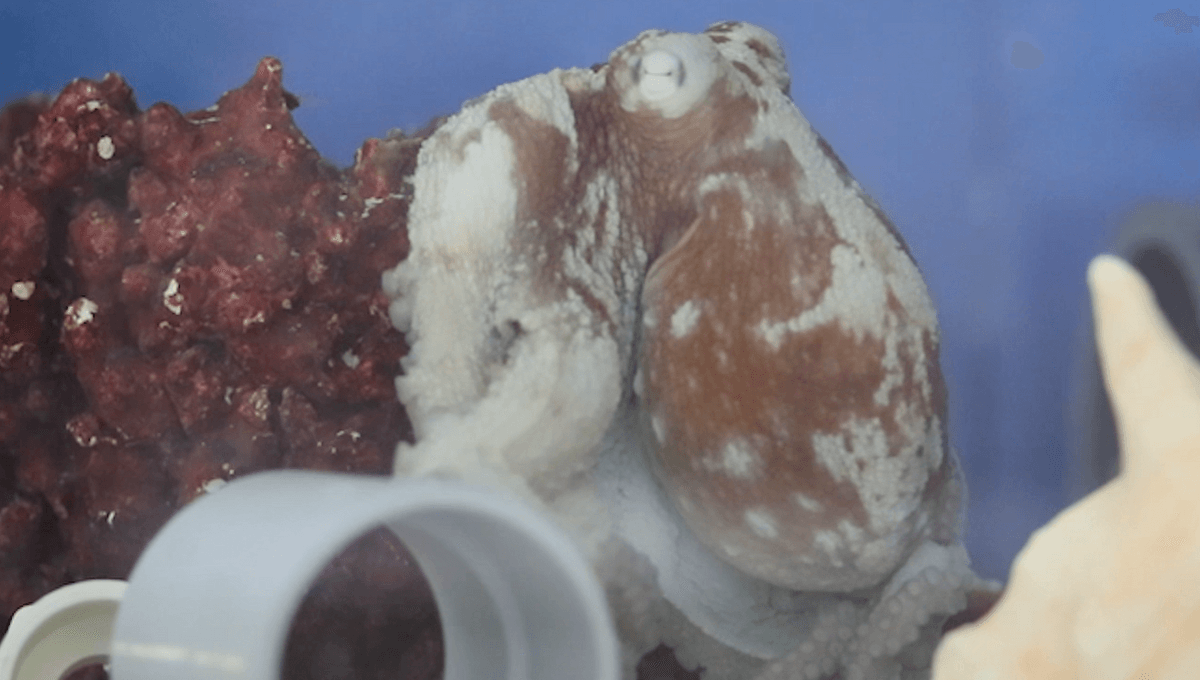
Keep an eye on an octopus taking a nap and you might catch their skin flashing between a sallow white tone and a vibrant color. Amazingly, scientists believe this is evidence of dreaming. While you might expect octopuses to dream happy thoughts of chasing shrimp, it appears that not all their dreams are pleasant – cephalopods might also experience nightmares.
New research has put forward the first evidence that suggests octopuses experience nightmares. The study – which has not yet been peer-reviewed – is based on observations of a male octopus (Octopus insularis) that lived at The Rockefeller University in New York City, miles away from its natural habit off the shores of Brazil.
It was monitored 24/7 with cameras pointed toward its tank. When reviewing the hours upon hours of footage, the researchers noticed that it underwent sudden changes in body pattern and coloration when it was apparently asleep.
Just like a dog flicking its feet in its sleep, they assumed the octopus was dreaming and physically reflecting the contents of its dream through its body language.
However, not all of this snoozy behavior appeared to be positive. On a number of occasions, he was seen abruptly awakening before flailing its limbs and squirting out a bloom of ink, as if it was evading an attack.
Could it be that the octopus was having a nasty dream of being stalked by a ferocious predator?
Of course, it would be impossible to enter the mind of a cephalopod, but the researchers argue this might be the case.
“The behavioral sequences displayed by this octopus upon emerging from disturbed sleep were similar to behavioral responses to nightmares, night terrors, and other parasomnias in humans, with a narrative structure resembling waking defense behaviors in octopuses,” the study authors write.
“We speculate that the complex behavioral sequences displayed in these episodes suggest octopuses experience parasomnias which may include nightmares with the potential to disrupt their sleep,” they added.
The team concede that this research was only based on a single octopus, so there’s a chance this is not universal behavior among the species and, in fact, this individual might just be an unusual guy.
That said, if we are to believe this species has vivid dreams, then it’s hardly a stretch to imagine that some of them might reflect the darker side their existence.
Furthermore, a mounting body of evidence is highlighting that octopuses, as well as other cephalopods, are incredibly intelligent creatures equipped with extraordinary brains.
It’s interesting to note that cephalopods and mammals are extremely far apart from each other on the Tree of Life, with our most recent common ancestor being a primitive flatworm that lived approximately 750 million years ago. Despite this chasm of time, we both evolved the ability to dream, suggesting it serves some kind of vital purpose for intelligent life.
“The potential occurrence of this phenomenon in octopuses would shed an unexpected light on the convergent evolution of sleep in distantly related organisms with complex neural architectures,” the researchers write in the conclusion.
The paper, which is yet to undergo formal peer review, was recently posted on the preprint server bioRxiv.
[H/T: New Scientist]
Source Link: Amazing Footage Suggests That Octopuses May Have Nightmares Too